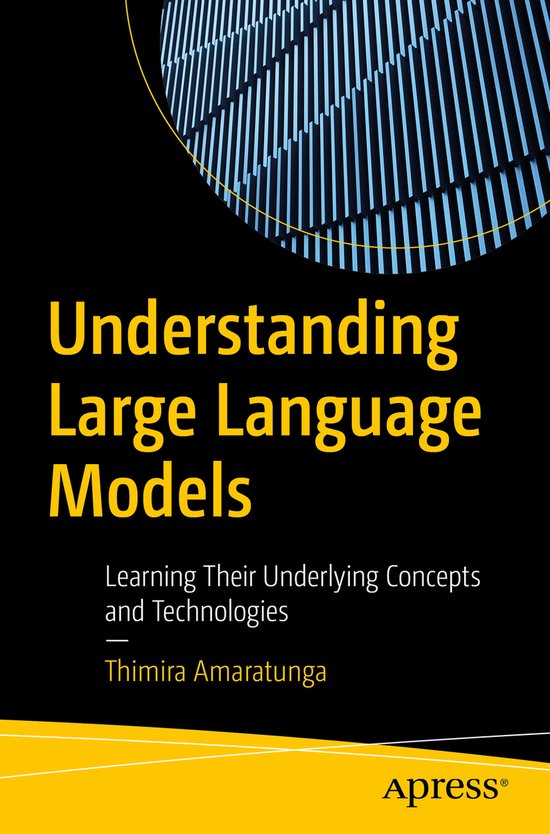Rbizo.com
Transformers for natural language processing and computer vision

Rubriek: Textual/Printed/Reference Materials - Boek
Prijs: € 32.99
Rating: 0/5
☆
☆
☆
☆
☆
Verzending:
Direct beschikbaar
Direct beschikbaar
Inhoudsopgave:
Omschrijving:
The definitive guide to LLMs, from architectures, pretraining, and fine-tuning to Retrieval Augmented Generation (RAG), multimodal Generative AI, risks, and implementations with ChatGPT Plus with GPT-4, Hugging Face, and Vertex AI
Key Features Compare and contrast 20+ models (including GPT-4, BERT, and Llama 2) and multiple platforms and libraries to find the right solution for your project Apply RAG with LLMs using customized texts and embeddings Mitigate LLM risks, such as hallucinations, using moderation models and knowledge bases Purchase of the print or Kindle book includes a free eBook in PDF format Book DescriptionTransformers for Natural Language Processing and Computer Vision, Third Edition, explores Large Language Model (LLM) architectures, applications, and various platforms (Hugging Face, OpenAI, and Google Vertex AI) used for Natural Language Processing (NLP) and Computer Vision (CV). The book guides you through different transformer architectures to the latest Foundation Models and Generative AI. You’ll pretrain and fine-tune LLMs and work through different use cases, from summarization to implementing question-answering systems with embedding-based search techniques. You will also learn the risks of LLMs, from hallucinations and memorization to privacy, and how to mitigate such risks using moderation models with rule and knowledge bases. You’ll implement Retrieval Augmented Generation (RAG) with LLMs to improve the accuracy of your models and gain greater control over LLM outputs. Dive into generative vision transformers and multimodal model architectures and build applications, such as image and video-to-text classifiers. Go further by combining different models and platforms and learning about AI agent replication. This book provides you with an understanding of transformer architectures, pretraining, fine-tuning, LLM use cases, and best practices. What you will learn Breakdown and understand the architectures of the Original Transformer, BERT, GPT models, T5, PaLM, ViT, CLIP, and DALL-E Fine-tune BERT, GPT, and PaLM 2 models Learn about different tokenizers and the best practices for preprocessing language data Pretrain a RoBERTa model from scratch Implement retrieval augmented generation and rules bases to mitigate hallucinations Visualize transformer model activity for deeper insights using BertViz, LIME, and SHAP Go in-depth into vision transformers with CLIP, DALL-E 2, DALL-E 3, and GPT-4V Who this book is forThis book is ideal for NLP and CV engineers, software developers, data scientists, machine learning engineers, and technical leaders looking to advance their LLMs and generative AI skills or explore the latest trends in the field. Knowledge of Python and machine learning concepts is required to fully understand the use cases and code examples. However, with examples using LLM user interfaces, prompt engineering, and no-code model building, this book is great for anyone curious about the AI revolution.
- 1 Bekijk alle specificaties
Beste alternatieven voor u.

Understanding Large Language Models
Rating: 4 / 5 | Prijs: € 43.99
this book will teach you the underlying concepts of large language models llms as well as the technologies associated with them the book starts with an introduction to the rise of conversational ais such as chatgpt and how they are related to the broader spectrum of large language models from
Direct beschikbaar .. MEER INFO

Understanding Large Language Models
Rating: 4 / 5 | Prijs: € 40.99
This book will teach you the underlying concepts of large language models llms as well as the technologies associated with them the book starts with an introduction to the rise of conversational ais such as chatgpt and how they are related to the broader spectrum of large language models from
Uiterlijk 21 januari in huis .. MEER INFO

Transformers for Natural Language Processing
Rating: 0 / 5 | Prijs: € 37.99
Publisher s note a new edition of this book is out now that includes working with gpt 3 and comparing the results with other models it includes even more use cases such as casual language analysis and computer vision tasks as well as an introduction to openai s codex key features build and impl
Direct beschikbaar .. MEER INFO
Product specificaties:
Taal: en
Bindwijze: E-book
Oorspronkelijke releasedatum: 29 februari 2024
Ebook Formaat: Adobe ePub
Hoofdauteur: Denis Rothman
Hoofduitgeverij: Packt Publishing
Lees dit ebook op: Desktop (Mac en Windows)
Lees dit ebook op: Kobo e-reader
Lees dit ebook op: Android (smartphone en tablet)
Lees dit ebook op: iOS (smartphone en tablet)
Lees dit ebook op: Windows (smartphone en tablet)
Studieboek: Nee
EAN: 9781805123743